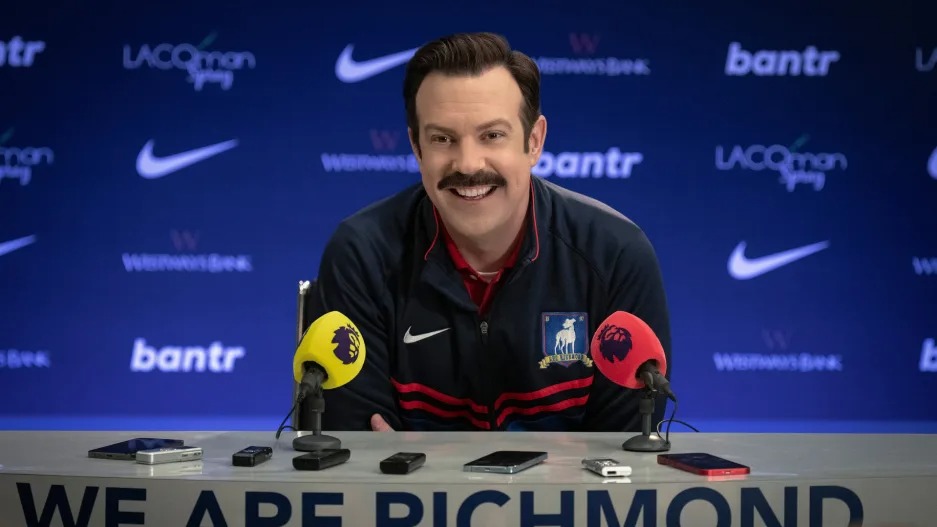- | 9:00 am
‘Ted Lasso’ shows us why leaders should aspire to be kind, rather than cutthroat
Season three is here.

Season three of Apple’s Ted Lasso premiered today. This season is set to be the show’s last, which is too bad, because the show has been replete with lessons on leadership at a time when the world is seeing a dramatic shift in what’s expected from bosses. It has also shown us what wild things can happen when a team is led from behind, even if it’s just allegory.
As a collegiate soccer athlete, my position was sweeper. It’s the last line of defense on the field, the one who sees the whole pitch from a forward-facing strategic vantage, who backs up her teammates when they need help, and calls the audibles that keep the team in motion. I rarely put the ball in the net myself, but I was expected to guide our team to win together.
This experience has stuck with me as I’ve grown in my career. Leading from behind is core to how I operate, and quite frankly requires an appetite for risk. Working my way through the ranks at established creative agencies has found me in a position much like Ted: entering into an existing culture and making curative changes. Like Ted, I believe it’s foolish to blow things up. Alternatively, trusting in people to rise to the occasion, asking questions in shared partnership, all while addressing head on what’s broken creates new opportunities for unexpected talents (like wunderkind assistant coach Nate Shelley) to emerge.
As the president of a creative services company that aims to leave the world a little better than we found it, we try to espouse these values. And after taking a closer look at where this season is headed, I noticed a profound parallel to the real world in the character arc of Nate Shelley, Ted’s assistant coach who at the end of season two leaves AFC Richmond to lead West Ham United. Not only is Nate a brilliant strategist, at the show’s start and through parts of season two, he reflected the kind of personality I’ve seen so often throughout my career.
In the beginning he was kind, soft-spoken, caring, forgiving and somewhat innocent. By the end of season two, he had more than earned his way into a top coaching job, but to get there he had to act in ways anathema to his true self. He found ways to see the worst in his colleagues, convinced himself that he deserved more recognition, and worked behind their backs to further his own career. He became cold, cutthroat, and singularly focused on his own ascent and willing to hurt the people that shone a light on him to begin with. Namely, Ted.
On the surface, one could say that Nate advocated for himself and got what he ultimately wanted. This is true. Nate deserved recognition and ascent. But watching the show, it’s clear that he’s lost something important, a piece of something good and true at the core of his being. Despite having a strong leader in Ted, Nate succumbed to a path that so many find themselves on because he was overlooked at key moments. It was a death by a thousand cuts, the vast majority of which presumably occurred well before Ted came on board. While Ted saw Nate’s potential and helped him flourish, he couldn’t undo years of trauma that defined Nate.
This dynamic exists in business, and it demonstrates why great leadership requires a sweeper’s mindset; where you can manifest wins by organizing.
the talent you have on the field according to their strengths. Step one is to discover what those strengths are, and to trust they will deliver. This can be done by asking for opinions before sharing your own, giving people a chance before deciding what they are capable of, presenting a calm but consistent pressure for team growth. It can also be done by rallying people together and making sure everyone is aligned, motivated, and knows where the ball is headed. This effective leadership style strongly contracts with Nate’s leadership style. He operates in a black box and believes himself to be the team’s superhero.
The pandemic forced me to embrace Ted’s lead-from-behind management style. The only way our company was able to survive was thanks to embracing a distributed power structure. It was impossible to be everywhere at once. In fact, many leaders had to let go and let our people do what they knew how to do. And guess what—people stepped up because they had our full trust. Now, each win is publicly known to be created by all of us, versus one ball hog taking all the credit.
This dynamic has brought our team closer together and has given me the confidence to lean even further into my instincts as a sweeper.
My hope for the final season of Ted Lasso is that Ted will lead his team to some kind of victory, while simultaneously showing Nate that you can both succeed and be an effective modern leader. In the end, winning to me means we all get to come to work as our best selves, free from feeling less-than, as one team unified to defy the odds, so that whatever happens we know we gave our best for our craft and for each other. It’s what Ted Lasso would do, and hopefully in season three he doesn’t let us down.







































